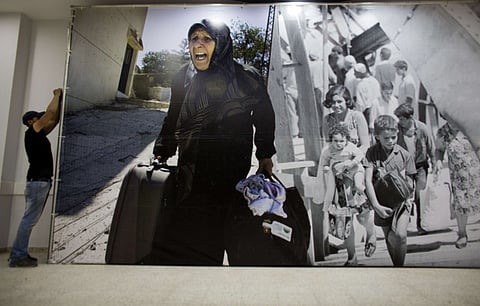Christians condemn Israeli division attempts
Israel has called on Palestinian Christians to sign up for military service

Occupied Jerusalem: In a region marked by sectarian division, Israel is trying to bring its Christian Palestinian population on side in a move aimed at splitting them from their Muslim compatriots, experts say.
This Israeli tactic has recently led to the army calling for the first time on Palestinian Christians to sign up for military service, and in a newly-passed law which formalises a distinction between Christian Palestinians and Muslims.
But ahead of a key visit to the Holy Land by Pope Francis which begins on Saturday, this apparent strategy of divide and rule has Palestinians worried.
Palestinians who live in 1948 areas are descendents of some 160,000 Palestinians who remained after the creation of Israel. Today their numbers stand at 1.4 million, 130,000 of whom are Christians.
Military service is not compulsory for Palestinians who live in 1948 areas, except for the tiny Druze community, and only around 100 Christians volunteer for service each year, army figures show.
But last month, Israel said it would start sending enlistment papers to all Christian Palestinians of military service age, angering Palestinian MPs who accused the government of seeking to divide Christians from Muslims.
The reaction of the Christian Churches was not slow in coming.
In Nazareth, a city with the largest Palestinian population, the Greek Orthodox Church sacked one of its priests after he publicly encouraged young Christians to join the army to understand “the importance of serving and getting involved in the country in which they live and which protects them.”
The Latin Patriarchate of Occupied Jerusalem, which represents the Roman Catholic Church, protested against the army’s decision to seek a tenfold increase in the number of Christian recruits annually.
“The issue is that these Christians are Palestinian,” said Michel Sabbah, patriarch between 1988-2008 and the first Palestinian to hold the post for centuries.
“If you accept yourself as Palestinian, you must be logical with yourself - you don’t go into an army which maintains occupation on Palestinians, or kills Palestinians.
“You have to be a good citizen but being a good citizen does not imply that you are ordered to kill your brothers who are Palestinians,” he said.
Opponents accuse nationalist right-wing elements within Netanyahu’s coalition of playing the “sectarianism” card and seeking to create a divide between Christians and Muslims.
“I don’t think that Israel is serious about integrating Palestinian Christians in Israeli society on the basis of full, equal-rights citizens. This is a clear attempt to split the Palestinians,” said political analyst Wadie Abu Nasser.
“If Israel is serious, why does discrimination continue vis-a-vis the Druze who serve in the army? And why doesn’t it allow Palestinian refugees of Christian background to come back?” said Abu Nasser, a former spokesman for the Latin Patriarchate.



